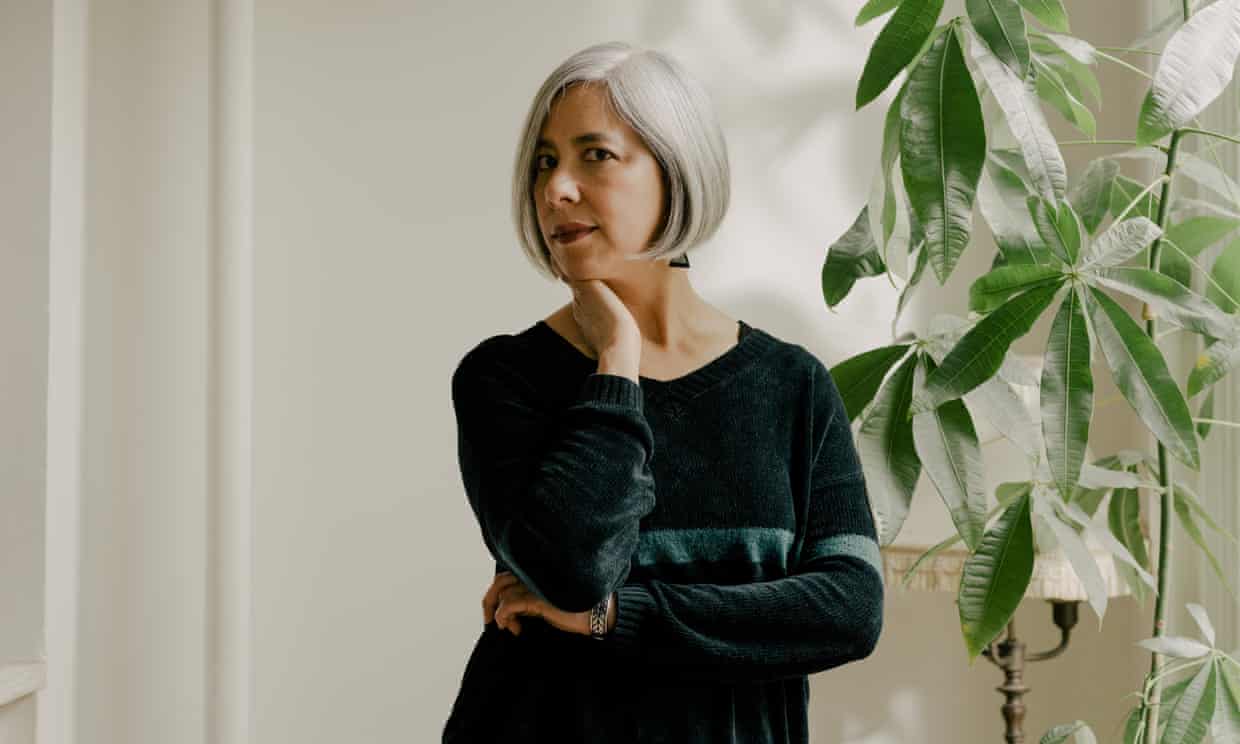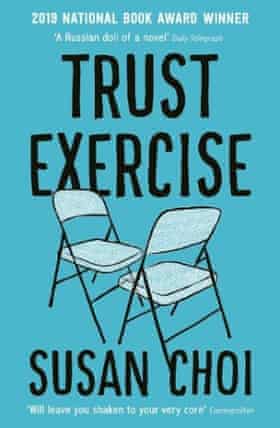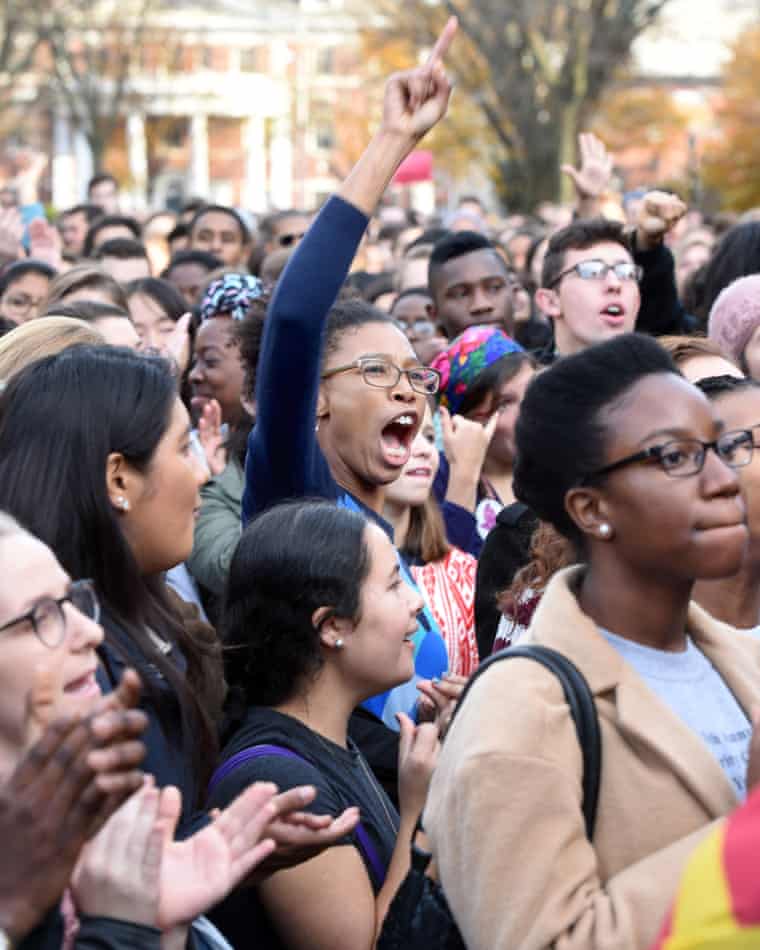
Books
Susan Choi: ‘A lot of people seem to feel very seen by the book’
Susan Choi had completed a draft of her novel Trust Exercise before the #MeToo movement began, but this US National Book award-winner is part of a vital conversation
by Justine JordanSusan Choi is “pretty partial” when describing Trust Exercise, which has won the National Book award for fiction and been a runaway sensation in her native US. “It’s a novel that begins with a group of young people at a performing arts school in the 1980s and follows them through a variety of events in their lives … and that’s all I say. I kind of evade.” Her reticence is driven by a fear not of spoilers, but of revealing too much about a narrative that halfway through throws the entire premise of the book into question and keeps the reader guessing even after the last page is turned.
The book does indeed begin among a group of teenagers, brimming with youthful passion for theatre and for each other, and vulnerable to predation from adults – not least the charismatic drama teacher Mr Kingsley, who feeds on their surging emotions like a vampire. As one student realises much later, the trust exercises in which he pushes them to reveal their vulnerabilities – murmuring during one session, “I won’t rest until you cry” – are “a kind of pornography”. This section is an intense, immersive story of first love gone wrong between 15-year-olds Sarah and David, and Sarah’s turmoil as she negotiates her conflicting feelings.

But then the novel takes a sharp corner; a minor character steps forward to seize control of the narrative, casting into doubt all that’s gone before. Looking back on their teenage years, Karen rages at how she has been “deformed” by an exploitative relationship with an older man; she also challenges Sarah’s version of events. She has done enough therapy to know that the version she’s setting out is also a construction, toggling between the third and first person within a single sentence as she shapes her truth. Choi writes brilliantly about female anger, sexual compulsion and disgust, and the messy uncertainties and terrible decisions of the teenage years. And as the characters come together as adults, they replay the dynamic between them: a novel exploring sexual consent and abuse also dramatises the way that “we never know, when life reunites us with someone, how closely our stories will match”.
Choi’s four previous novels were all successes, with awards and shortlistings, but the response to Trust Exercise has been something else entirely. “I’ll walk into a crowded room and have people I’m not connected to in any way walk up to me and start talking about it. I’m gratified and moved and also overwhelmed. A lot of people seem to feel really seen by the book in terms of their own past experiences. Sometimes I’m tempted to say, ‘I’m so sorry!’”
Choi had been tinkering with the novel for years, as light relief from a project that wasn’t working. “I spent all of my interventionist writerly anxiety on this other thing. In the meantime Trust Exercise evolved by itself – one of those children that has to raise herself and somehow ends up more tough as a result.”
Though it takes its place in the literature of #MeToo, the first draft was already written by the autumn of 2017, when the Harvey Weinstein scandal began to unfold. As a key line in Trust Exercise has it: “We almost never know what we know until after we know it.” “Women have been talking about this since time immemorial,” Choi points out. “We all learned those lessons that seemed part of the normal world, that as a 12- or 14-year-old girl you would have to instinctively ward off the attention of predatory people and it was your problem. It was your problem if you applied for a job as a young teen and the boss invited you away for the weekend. It was your problem if you were assaulted.
“At last society began talking about it openly. People went: ‘Oh wait, maybe this is everyone’s problem.’ The book was suddenly surprisingly in conversation with all this stuff that was happening in the world.”
In fact this novel about contested personal histories has its roots in an even wider debate: the question of who writes the national story. Over the course of 2016 and the US election, Choi was enraged by what she calls “the diabolically effective Trumpian knack for recasting the American narrative in a way that bullies all of us into responding even if we completely disagree with it. ‘Make America Great Again’ is a story. It’s a story about America having been much better before, and now it’s gone into decline, and we must get it back to where it was. And there’s all this subtext: well, what great America are we talking about exactly? For whom was it great? Who are those that we blame for the loss of greatness? Even when Trump’s version is demonstrably false, the storytelling power is undiminished. He has a genius for making you feel very isolated in your dissent, even if you’re surrounded by dissenters.
“That was really where Karen came from, because I felt so angry all the time. I specifically felt as though someone had taken a story that was my story – the story of my country, my origins. I’m the daughter of an immigrant, I’m the granddaughter of immigrants, I’ve always been so proud of that. I can’t believe that now we have to retell that story again and push back so aggressively on this demonisation of immigrants.”
The question of who controls the story is a burning issue at the moment, not only in the books world – look at the current anger over cultural appropriation in the migration thriller American Dirt – but on the wider canvas of news manipulation and climate crisis denial. In the novel, Karen is the furious figure from the margins who complicates an airbrushed version of history. “Of course [he] wanted to normalise,” she spits of another character. “What criminal doesn’t.”
Some of the most interesting #MeToo novels play with form and the upending of readerly expectations: Mary Gaitskill’s radically brief and murkily ambiguous This Is Pleasure; Lisa Halliday’s tripartite Asymmetry, which like Trust Exercise juxtaposes a power-imbalance relationship with an inquiry into what it means to write about other people. What the reader gains from such structural disruption, says Choi, is a “shock of enhanced consciousness”. “Being startled by these books that interrogate their own form can be incredibly instructive. It does lay bare, almost like an X-ray, all of these mechanisms. That you have entrusted your belief to a particular point of view – and why did you do that? Is there another point of view that might be contesting that one, are there other aspects to this story?”
It’s only fitting, she says, that the reception of her own book has mirrored the disputed nature of the territory it’s exploring. Readers have argued over what “really” happened; demanded to know what happened “next” (Choi has her own theory, but she’s not telling). “These conversations do start echoing things that are happening within the book itself about who’s the most trustworthy storyteller. You decide who you believe, who you trust, who you’re biased for. I always admit that I’m completely biased for Karen, in large part because she wears her anger on her sleeve. The unleashed self!”
Choi may be biased for Karen, yet she’s put a “self‑lacerating” image of herself into the figure of Sarah, who writes about their shared teenage years. “I envisage myself in public as an author and I cringe – I view myself from the outside with Karen’s sneer of contempt. The smiling, the fussing with the hair. It all goes back to how self-conscious I felt as an acting student.”
Choi’s own time in a high school theatre programme in Houston was, she stresses, nothing like the “dark underbelly” portrayed in Trust Exercise. “One of the great benefits of fiction as opposed to memoir is that you can repurpose your own experience in ways that are far more extreme, disturbing and consequential. I’ve done it in other books – I’ve had to apologise to my parents and say this might remind you of yourself in certain ways, but I was really trying to create the monster demon version of you, not actually you. They’re very tolerant of this.”

Now 51, Choi was born in Indiana to a Korean father and a Jewish mother (“My mother made latkes and my father put soy sauce on them”). Her father was a maths professor, her mother a secretary. “Like so many women of her generation, she was undereducated and underemployed for her intelligence. She could have been the professor but she was the typist.” Both, she says, were “outliers – unconventional for their context. My father didn’t push me to go to med school or law school. It sounds like a cultural stereotype, but I’ve met any number of Asian Americans around my age who have expressed wonder that his attitude was ‘do what you want’.”
What Choi wanted to do was study literature at Yale and Cornell (“reverently reading bewildering photocopies about poststructuralism. I was always being made to feel an idiot”), after which she got a job at the New Yorker. In 1998 she published her first novel, The Foreign Student, based on her father’s experiences in the Korean war and his time in the south after he came to the US to study. Her Pulitzer-shortlisted second novel, American Woman, was set during the 1970s antiwar movement; A Person of Interest was inspired by Unabomber Theodore Kaczynski, and My Education in 2013 followed the fallout of an affair between a student and her professor’s wife.
Academia, and the power differential between student and teacher, are recurring themes in her fiction. “The pedagogical relationship is inherently interesting because there’s so much unresolved tension. In certain creative contexts there’s an active erasure of that power differential - we’re artistic people, we’re special people, we’re unconventional. All of those rules and structures don’t apply to us. It can end up wonderful or it can end up dangerous.”
Choi returned to Yale, as a teacher of creative writing, in 2015. Her arrival coincided with a headline-grabbing campus controversy over cultural appropriation and free speech, after a request for students to avoid racially insensitive Halloween costumes prompted a lecturer to wonder publicly if universities were becoming “places of censure and prohibition”. It was an opportunity for Choi to reflect on how much had changed, or hadn’t, in the three decades since she’d been an undergraduate. “The campus was so roiled by this issue – it was really painful. I wrote a lot of Trust Exercise that semester, while I was trying to digest everything.” One of the big differences now, she says, is that “things that are still difficult are much better recognised. When I was an undergraduate there was a sense that ‘Everything’s fine, everything has been fixed. We admitted women! What more could we possibly do?’ And now the entire community is much more engaged with the reality that we are never done working on this.”
Many of the conversations in Trust Exercise will ring true for readers whose #MeToo discussions have crossed the age and gender divides. “You weren’t some helpless victim,” insists the older David to Karen. When she points out to him that they were children, he responds scornfully: “We were never children.” Attitudes to adolescence have changed dramatically since the 80s, Choi points out. “I have 12- and 15-year-old boys, and if my child was in a theatre programme being conducted in the way that mine was conducted when I was that age, I would have freaked out. But one of the things I loved about it was that it offered absolute freedom from parental control. With my kids, I’m like: ‘I need to know you’re safe.’ I never offered my own parents that luxury. I was very little sheltered and very little controlled.”
Over the past decades, “a lot of people have woken up to the fact that if you do treat 12- to 18-year-old people as though they’re adults, it is almost inevitable that some of them will suffer terrible harm, from a predatory sexual point of view. But other things are more confusing. Do we shelter our children too much from every kind of adversity? Are we never allowing them to be sad, or bored, or disappointed? Socially we don’t know how to think about it – the ages that we legislate to do certain sorts of things are all different. We never can decide when these interesting creatures stop being children and start being adults, because it’s such a ragged transition.”
Choi is now set to adapt Trust Exercise as a TV series, a challenging prospect for a work defined by formal invention, a shifting cast of characters and ambiguous silences. And it’ll be a further distraction from that difficult ongoing project – which is similarly engaged with history and memory, toxic emotions and contested narratives. This centres on her father’s father, who was an eminent intellectual during the Japanese occupation of Korea. His work is still taught there today, but he’s considered a national traitor – “at best hopelessly compromised, and at worst an active collaborator”. When she first went to Korea as an adult, following the translation of The Foreign Student, “I was greeted by people saying: ‘It’s wonderful you can come here and hold your head up high, not feel ashamed.’” She smiles wryly. “I’ve been trying to write about it ever since.”
• Trust Exercise by Susan Choi is published by Serpent’s Tail (RRP £8.99). To order a copy go to guardianbookshop.com. Free UK p&p on all online orders over £15.